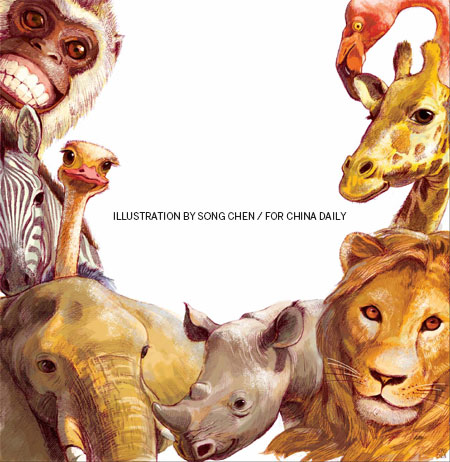Back to nature
Updated: 2013-03-15 11:10
By Li Lianxing (China Daily)
|
||||||||

China increases efforts to protect African wildlife through public campaigns and private missions
It is a vicious circle - as the numbers of African elephants dwindle, and protection efforts and public awareness campaigns intensify, supplies of ivory become scarcer, driving up prices, and so poaching increases.
"More than 25,000 elephants were illegally killed in 2011, and the analysis done so far for 2012 shows that the situation has deteriorated rather than improved," says John Scanlon, secretary-general of the Convention on International Trade in Endangered Species of Wild Fauna and Flora (CITES).
"Elephants in the Dust - The African Elephant Crisis", a new report by the UN Environment Programme, CITES, the International Union for Conservation of Nature and the Wildlife Trade Monitoring Network, says large-scale seizures of ivory destined for Asia show criminal networks are increasingly active and entrenched in the trafficking of ivory between Africa and Asia.
Loss of habitat is also threatening the survival of elephant populations in Central Africa, as well as previously secure populations in West, East and southern Africa.
As the main market for ivory, Asian countries bear a larger share of international responsibility to break this cycle of life and death for the elephant, and also the rhino, prized for its horn.
China, now getting to grips with its own nature conservancy challenges, is making moves to do so, through aid and education programs, in cooperation with other agencies and countries, and by private individuals.
At the 16th CITES meeting in Thailand earlier this month, the Chinese delegation pledged it would take further steps to stop the trade in ivory products and put the African elephant in the highest protection category.
A Chinese Forestry Ministry official told the CITES meeting that greater international cooperation and more effective strategies were required to stop poaching.
Wealth worries
|
||||
The soaring price of ivory is the main reason for the increase in elephant poaching, Muya says.
A 2011 report by the KWS and other organizations said the price of a pair of tusks from a large elephant, poached in the north of the country, was equal to 18 months' salary for a wildlife ranger, or 15 years' salary for an unskilled worker.
The new wealth in China has worried many animal protection groups.
"There is more disposable income in China today than at any time in history. Ivory has the cachet of being a luxury-status commodity and more people than ever are able to own a piece now," says Tom Milliken, global elephant and rhino program leader for a wildlife trade monitoring network called Traffic, which described 2011 as an "annus horribilis" for African elephants in a report.
The ivory trade boomed in the late 19th century, bringing Africa's first wave of wholesale elephant slaughter, although things improved when measures to regulate the trade were introduced in the early part of last century.
However, rising prosperity in the Asian region, especially in Japan, in the 1970s and 1980s saw the animals come under widespread attack again, says the KWS.

 Li Na on Time cover, makes influential 100 list
Li Na on Time cover, makes influential 100 list
 FBI releases photos of 2 Boston bombings suspects
FBI releases photos of 2 Boston bombings suspects
 World's wackiest hairstyles
World's wackiest hairstyles
 Sandstorms strike Northwest China
Sandstorms strike Northwest China
 Never-seen photos of Madonna on display
Never-seen photos of Madonna on display
 H7N9 outbreak linked to waterfowl migration
H7N9 outbreak linked to waterfowl migration
 Dozens feared dead in Texas plant blast
Dozens feared dead in Texas plant blast
 Venezuelan court rules out manual votes counting
Venezuelan court rules out manual votes counting
Most Viewed
Editor's Picks

|

|

|

|

|

|
Today's Top News
Boston bombing suspect reported cornered on boat
7.0-magnitude quake hits Sichuan
Cross-talk artist helps to spread the word
'Green' awareness levels drop in Beijing
Palace Museum spruces up
First couple on Time's list of most influential
H7N9 flu transmission studied
Trading channels 'need to broaden'
US Weekly

|

|











